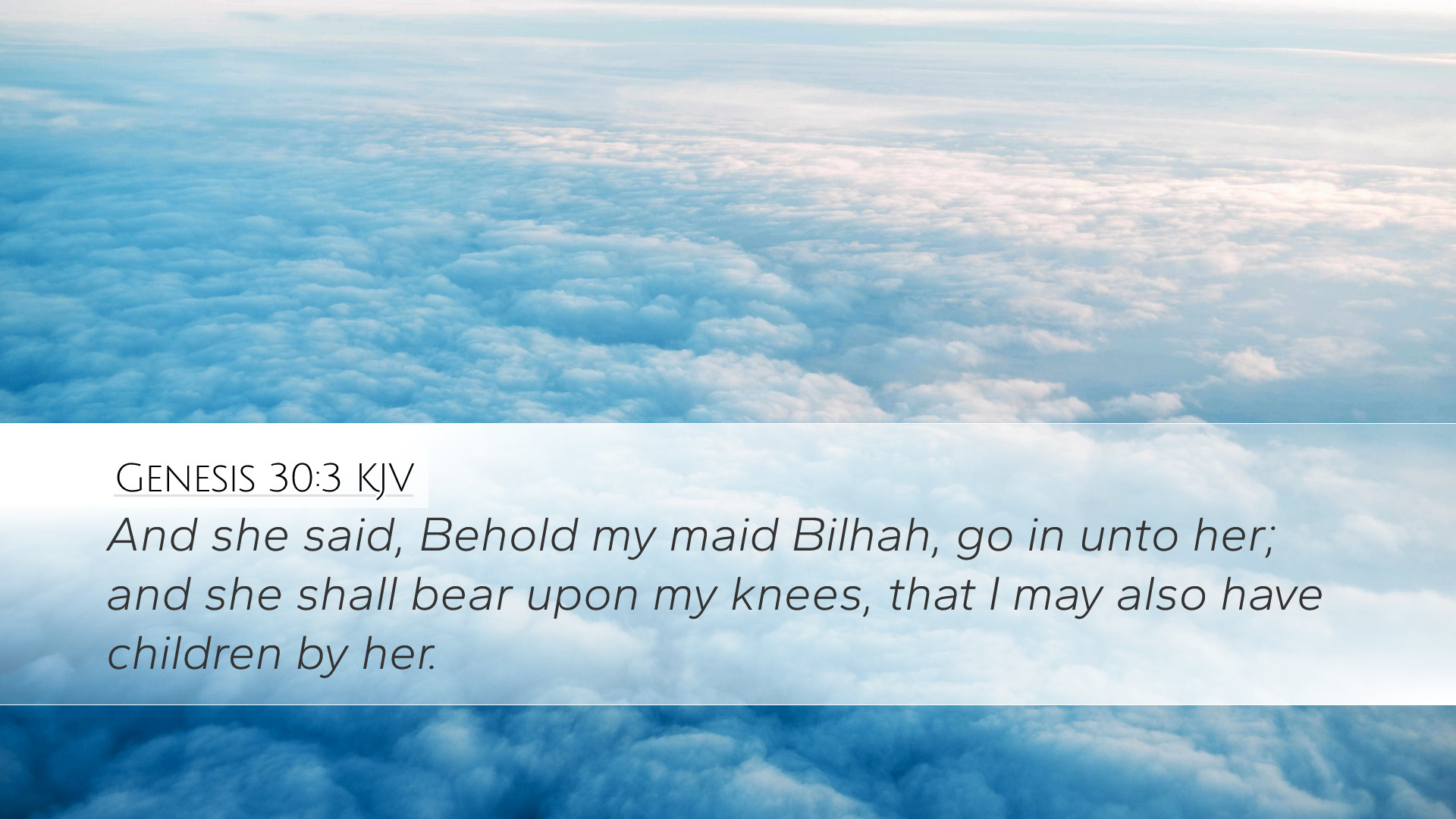Commentary on Genesis 30:3
Genesis 30:3 states: "And she said, Behold my maid Bilhah, go in unto her; and she shall bear upon my knees, that I may also have children by her." This verse opens a window into the complex family dynamics within Jacob's households and the cultural context of ancient Near Eastern customs regarding surrogate motherhood.
Contextual Background
The narrative of Genesis 30 occurs against the backdrop of familial rivalry and personal desperation. Rachel, Jacob's cherished wife, feels the intense pressure of infertility, leading her to propose the use of her maidservant Bilhah as a substitute for childbearing. This situation reflects both the social norms of the time and the desperate measures taken by women in a patriarchal society to secure their status and fulfill their roles as mothers.
Insights from Matthew Henry
Matthew Henry emphasizes the deep sense of rivalry between Leah and Rachel. He notes that Rachel's cry for children reflects not merely a desire for offspring but a cultural understanding that children were a sign of favor and blessing from God. Henry articulates that Rachel's actions arise from her deep frustration and jealousy, which drives her to employ Bilhah in a way that highlights her lack of faith in God’s provision.
-
Human Weakness: Henry points out that Rachel's resort to human devices instead of waiting on God illustrates a common weakness found throughout Scripture—betting on human ingenuity rather than divine intervention.
-
Surrogacy and Cultural Practices: He examines the practice of surrogacy as a means of ensuring legacy, a common practice in their cultural context. The use of handmaids for childbearing is presented not just as a personal choice but as a culturally accepted norm providing a lens through which to understand the broader implications of this decision.
Insights from Adam Clarke
Adam Clarke provides a thorough textual analysis of the theological implications of Rachel's actions. He notes the poignancy of her declaration regarding Bilhah and underscores that she is acting out of sheer necessity rather than divine direction. Clarke reminds readers that the choice of surrogacy does not exempt Rachel from the emotional and spiritual responsibilities tied to motherhood.
-
Faith and Desperation: Clarke posits that Rachel's desperation reveals the human tendency to take matters into our own hands when faced with challenges. He argues that such an approach often yields complex consequences, as seen in the relational strife that follows in the family.
-
The Role of Women: Clarke observes the limited agency of women in the ancient world, noting how Rachel's identity as 'the beloved wife' is challenged by her inability to bear children. This historical perspective invites reflection on the value and dignity of women throughout Scripture.
Insights from Albert Barnes
Albert Barnes approaches the text by examining the implications of Rachel's request and the forthcoming childbearing through Bilhah. Barnes draws connections between this narrative and the larger biblical themes of providence and responsibility.
-
God’s Sovereignty: Barnes stresses that even within human frailty, God’s plan is sovereign. The births that result from Bilhah would ultimately tie into God’s larger narrative through Jacob’s lineage. This underscores the belief that God's purposes will prevail even amid chaos and human error.
-
Motive and Divine Purpose: The motivations behind Rachel's plea are critically analyzed, with Barnes noting that while Rachel acts out of jealousy and desperation, God's overarching sovereignty ensures that His will will be accomplished through the challenges that arise.
Theological Reflections
In synthesizing insights from the above commentaries, Genesis 30:3 serves as a rich tapestry illustrating the multifaceted nature of human relationships, divine providence, and cultural practices. It provides a platform for theological reflection on several key themes:
-
Divine Provision vs. Human Effort: This verse brings forth the question of how often believers resort to their own understanding, neglecting God's promises. It invites introspection regarding faith in God's timing, especially in our personal struggles, whether they are relational, physical, or spiritual.
-
Family Dynamics and Rivalry: The familial strife mirrors the complexities seen in contemporary relational conflicts. The emotional tug-of-war present in Jacob’s family encourages discussions on envy, rivalry, and the need for familial unity built on love and respect.
-
Legacy and Motherhood: The theme of legacy can be emphasized within the broader biblical narrative. Rachel’s yearning for children highlights the fundamental human desire to be significant and remembered. The call to spiritual motherhood and nurturing in all facets—physical, emotional, and spiritual—carries through the Church’s ethos today.
Conclusion
Genesis 30:3 encapsulates a pivotal moment in the life of Jacob's family, marked by intrigue, desperation, and the complexities of human relationships. As scholars, pastors, and theologians engage with this text, it provides a profound reflection on themes of faith, human agency, cultural practices, and divine sovereignty. Ultimately, the insights offered by respected commentators like Matthew Henry, Adam Clarke, and Albert Barnes elevate our understanding, encouraging a deeper exploration of Scripture's rich narrative and theological foundations.


